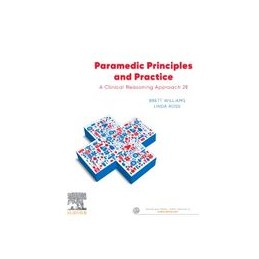- Reduced price

Order to parcel locker

easy pay


 Delivery policy
Delivery policy
Choose Paczkomat Inpost, Orlen Paczka, DHL, DPD or Poczta Polska. Click for more details
 Security policy
Security policy
Pay with a quick bank transfer, payment card or cash on delivery. Click for more details
 Return policy
Return policy
If you are a consumer, you can return the goods within 14 days. Click for more details
Edited by expert academics and educators, Brett Williams and Linda Ross, and written by content specialists and experienced clinicians, this essential resource encourages readers to see the links between the pathophysiology of a disease, how this creates the signs and symptoms and how these should to be managed in the out-of-hospital environment. Additionally, Paramedic Principles and Practice 2e will arm readers with not only technical knowledge and expertise, but also the non-technical components of providing emergency care, including professional attitudes and behaviours, decision-making, teamwork and communication skills.
Case studies are strategically used to contextualise the principles, step readers through possible scenarios that may be encountered and, importantly, reveal the process of reaching a safe and effective management plan. The case studies initially describe the pathology and typical presentation of a particular condition and progress to more-complex and less-typical scenarios where the practitioner faces increasing uncertainty.
Data sheet
Part 1: PARAMEDIC PRINCIPLES
SECTION 1: INTRODUCTION TO PARAMEDIC
SECTION 2: FOUNDATION KNOWLEDGE
SECTION 3: FOUNDATION CONCEPTS
SECTION 4: COMMUNICATION AND NON-TECHNICAL SKILLS
SECTION 5: THE AUSTRALIAN AND NEW ZEALAND HEALTHCARE SYSTEMS
SECTION 6: PATIENT AND PARAMEDIC SAFETY
SECTION 7: LEGAL, ETHICAL AND PROFESSIONAL CONSIDERATIONS
Part 2: PARAMEDIC PRACTICE
SECTION 8: THE PARAMEDIC CLINICAL APPROACH
SECTION 9: THE PARAMEDIC APPROACH TO THE PATIENT WITH A RESPIRATORY CONDITION
SECTION 10: THE PARAMEDIC APPROACH TO THE PATIENT WITH A CARDIAC CONDITION
SECTION 11: THE PARAMEDIC APPROACH TO THE PATIENT WITH A MEDICAL CONDITION
SECTION 12: THE PARAMEDIC APPROACH TO THE TRAUMA PATIENT
SECTION 13: THE PARAMEDIC APPROACH TO THE PATIENT WITH AN ENVIRONMENTAL CONDITIONS
SECTION 14: THE PARAMEDIC APPROACH TO COMPLEX CASES: SPECIFIC CHALLENGES TO PARAMEDIC REASONING AND MANAGEMENT
SECTION 15: THE PARAMEDIC APPROACH TO THE PATIENT WITH A MENTAL HEALTH CONDITION
SECTION 16: THE PARAMEDIC APPROACH TO OBSTETRIC, NEONATAL AND PAEDIATRIC PATIENTS
Appendix 1: Medications commonly encountered in paramedic practice
